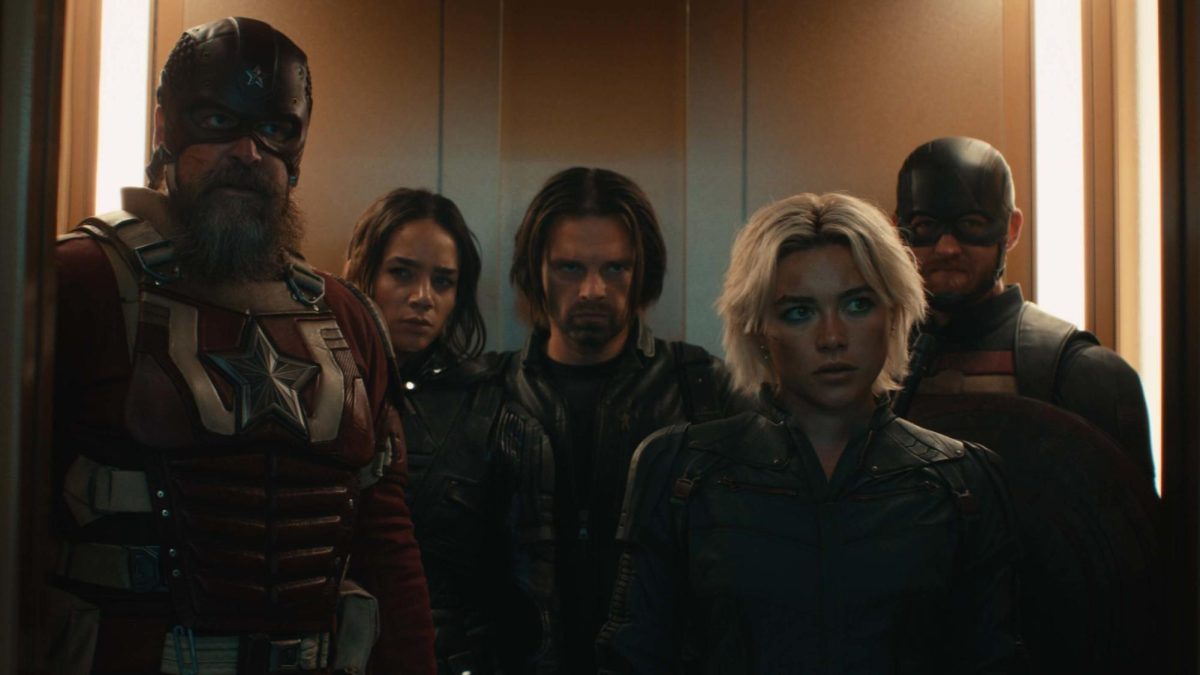Warning: This article contains slight spoilers.
On May 3, I saw Marvel Studios’ “Thunderbolts*.” As a Marvel fan, it lived up to my expectations and even exceeded some of them.
“Thunderbolts*” focuses on the characters of Yelena Belova, U.S. Agent, Ghost, Red Guardian, Bucky Barnes and Robert “Bob” Reynolds as they are forced to join forces against Valentina Allegra de Fontaine to stop her from making her own superhero and having unlimited control and power. In light of the absence of the Avengers, this potentially enables her to not be impeached or questioned by the government for her misdeeds. The film stars Florence Pugh, Wyatt Russell, Hannah John-Kamen, David Harbour, Sebastian Stan, Lewis Pullman and Julia Louis-Dreyfus.
It is no secret that the Marvel Cinematic Universe has not been as successful as it was before 2019’s “Avengers: Endgame.” Outside of hits like 2024’s “Deadpool and Wolverine,” 2023’s “Guardians of the Galaxy Vol. 3” and 2021’s “Spider-Man: No Way Home,” the franchise’s critical reception and box office earnings have decreased over the last six years. However, “Thunderbolts*” is a return to form for Marvel Studios’ cinematic franchise.
The best part of the film is its focus on its characters. All films technically focus on their characters, but not to the same degree. All of the main characters in “Thunderbolts*” deal with past trauma and darkness. Their journeys to move forward and have brighter futures are focused on. Thankfully, the film does not shy away from this at all. The two strongest examples of this come from the story arcs of Bob and Yelena.
Being a Black Widow, Yelena experiences the world of assassins throughout her whole life. In the film, it is made clear that she is tired of this lifestyle. Because of this and the death of Natasha, her sister and the original Black Widow, she is depressed and wants something different out of life.
Bob is used as a government test subject, and his past experiences with abuse and drug addiction lend to his tragic story. His scenes with Yelena are among the most heartfelt in the film because of how they bond and relate to each other over having voids in themselves that they cannot fill.
The central message of mental health awareness is portrayed through these character arcs and moments. Even though the action and comedy are done very well, this message is the most impactful aspect of the film. Topics such as regret, isolation, loneliness, suicide and PTSD are explored in ways that do not feel poorly handled.
It is estimated that 970 million people globally experience mental health disorders. That number most likely fluctuates daily, but a lot of people have these experiences nonetheless. Even though “Thunderbolts*” is a comic book film with fictional characters and fantastical elements, it still manages to portray these issues and topics in grounded ways. The film can serve as a uniquely relatable piece of media for those who struggle with mental health.
What makes this grounded aspect of the film even better is that it goes against the multiversal story elements that Marvel has put in a lot of their most recent projects. Aside from “Spider-Man: No Way Home” and “Deadpool and Wolverine,” 2022’s “Doctor Strange and the Multiverse of Madness,” 2021’s “Loki” and “What If…?” are projects that heavily relied on the concept of the multiverse. As fun as these shows and films are, I feel as if they somewhat sacrifice good character drama and focus for empty fan service moments like cameos and callbacks to earlier films that had no lasting impact. “Thunderbolts*” goes back to basics and just tells a good story.
“Thunderbolts*” is the best Marvel film in a while and my favorite movie of the year so far. Hopefully, its quality is a sign of what is to come for future MCU releases.
This story was written by Christopher Hayden. He can be reached at christopher.i.hayden@marquette.edu.


